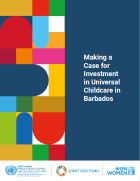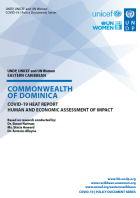1 - 20 of 21 Results
Pagination
Date:
In Saint Lucia, meaningful and effective public intervention in the childcare market is necessary to create a system that works for all parents/guardians and children, and that benefits the overall economy. In fact, an increase in access to quality early childhood services can have several social and economic benefits, and help to bring Saint Lucia closer to meeting various Sustainable Development Goals (SDGs) in the 2030 Agenda for Sustainable Development.
Date:
This report makes an argument for public investment in universal childcare in Barbados; specifically, it explores the potential effects and benefits of investing in universal childcare. Effective provision of universal childcare is defined as one that eliminates barriers to equitable access and participation.
Date:
This policy brief discusses the potential and limitations of universal basic income (UBI) from a gender perspective and points to some of the specific design features that policymakers need to consider to make UBI work for women and transgender and gender-diverse people.
Date:
The COVID-19 pandemic has posed a tremendous threat to global health, poverty reduction gains and advances made towards gender equality. Globally, by April 13, 2021, 136,115,434 confirmed cases, and 2,936,916 deaths had scarred nations. The 35 countries/territories in the Caribbean region alone had suffered 630,239 confirmed cases and 8,571 deaths, as of April 6, 2021. Still, this pandemic has had impacts far beyond public health.
Date:
Based on research conducted by Dr. Simon Naitram; Ms. Stacia Howard and Dr. Antonio Alleyne This report forms part of the COVID-19 Human and Economic Assessment of Impact (HEAT) Series. The COVID-19 pandemic is projected to increase the strain on the economy as supply chain disruptions, reduced domestic consumption and lower remittances will increase the downward pressure on economic growth. Building on baseline scenarios, the report presents the likelihood of a GDP decline in excess of...
Date:
Based on research conducted by Dr. Winston Moore This report forms part of the COVID-19 Human and Economic Assessment of Impact (HEAT) Series. The Government implemented a series of measures designed to respond to the health, economic and social impacts of the virus. These interventions include a substantial increase in health sector expenditure equivalent to 0.5% of GDP, the deployment of international disease specialists and a robust testing and quarantine programme, which has...
Date:
Based on research conducted by Dr. Ankie Scott-Joseph This report forms part of the COVID-19 Human and Economic Assessment of Impact (HEAT) Series. Among its recommendations are: Increase gender-responsiveness of COVID-19 policy responses. Broaden safety protection support in the form of enhanced unemployment insurance with extended duration, increased benefits, relaxed eligibility, and expanding social assistance coverage through the establishment of a Welfare Development Fund. ...
Date:
Women are the majority of clerks, service workers and shop and market sales workers, and professionals. While skilled professionals can work from home where feasible, the rest of these women are severely impacted by the COVID-19 crisis: the women working in tourism and in non-essential services are not earning a wage, with women working in tourism out of a job for an unknown amount of time.
Date:
This report outlines a number of recommendations including: enabling the availability of low-cost options for internet access to improve the livelihood potential of the most vulnerable in society and reduce inequalities due to moving to online learning by broadening access to the internet for children in poverty; inclusion of informal workers into the formal economy through the National Insurance Scheme which in the long term will increase the number of contributions and significantly improve the health of the National Insurance Fund; expansion of the Central Bank of Barbados’ Credit Guarantee scheme; ensuring social assistance for all who need it, including making unemployment benefits for self-employed individuals permanent to reduce their vulnerability in times of uncertainty and increasing the attractiveness of the entrepreneurship sector which serves as the engine for economic growth; and increasing the limit on the Health Service Levy to expand healthcare facilities and make contributions progressive.
Date:
The HEAT assessment reports are a series of publications from the United Nations Sub-Regional Team in Barbados and the Eastern Caribbean which form part of the combined offer from the UN system to support countries in their response to the COVID-19 pandemic. Coordinated by the United Nations Development Programme, UNICEF and UN Women, the new HEAT report series will cover 8 Eastern Caribbean islands, providing deep insights, strategic recommendations and a framework to promote relief and resilience.
Date:
The extent of the socio-economic fallout from the COVID-19 pandemic has begun to shape the “new normal” for CARICOM Member States. A 1.5% contraction of Gross Domestic Product has already been estimated by the Economic Commission for Latin America and the Caribbean (ECLAC, 2020). While governments balance this “new normal,” there is also an ‘above-average’ forecast for the 2020 Atlantic Hurricane Season, which takes place from June 1 to November 30.
Date:
While leaders and the business community discuss when and how to open economies, it is critical that we think about the impact this will have on families, parents and those who care for the elderly. The work that happens inside the home, cooking, cleaning, care of children, and care of the elderly is called care-work. Although some families benefit from the support of domestic workers, most of the work done is unpaid or underpaid.
Date:
This brief synthesizes research findings, analysis and policy recommendations on the strategies that were used by UN Women’s Multi-Country Office in the Caribbean to promote gender-responsive social protection in a context where reforms have been driven mainly by efforts to reduce public debt and promote economic competitiveness.
Date:
Informed by the results of several investigative efforts, St Lucia is now at an advanced stage in developing and implementing an integrated social protection system.
Date:
St Lucia’s Quarterly Labour Force Surveys of 2012 suggest that the educational achievements of women aged 15 years and above are noticeably higher than those of men in the same age group.
Date:
UN Women’s work in this area focuses on measures that enhance and secure the financial independence of women; promote their equal participation; and, provide socio-economic protections that would contribute to reduction in poverty and inequality, would enhance the quality of life of women and their families.
Date:
The social safety net assessments conducted in Eastern Caribbean states in and around 2009 recommended that countries should develop a proxy means test (PMT) to replace the diverse approaches they were using to target poverty-related benefits.
Date:
Eastern Caribbean countries are currently developing and implementing substantial social safety net reforms. Governments of six Eastern Caribbean countries conducted social safety net assessments in 2009 – 2010, with the support of UN Women and UNICEF in partnership with the World Bank.
Date:
Conditional Cash Transfers: Learning From The Literature
Date:
The social safety net assessments conducted in Eastern Caribbean states in and around 2009 recommended that countries should develop a proxy means test (PMT) to replace the diverse approaches they were using to target poverty-related benefits.




















